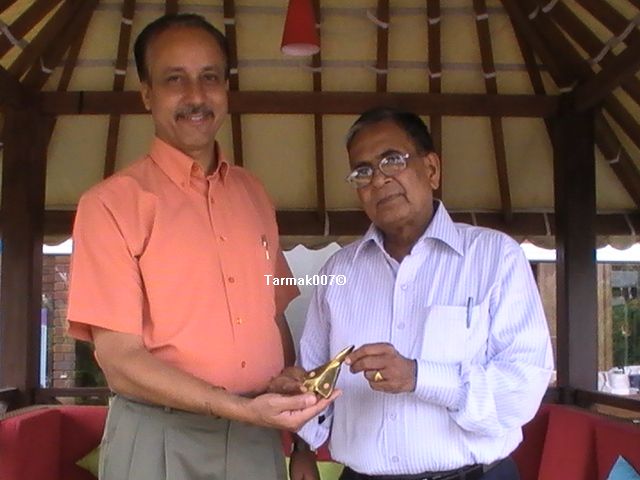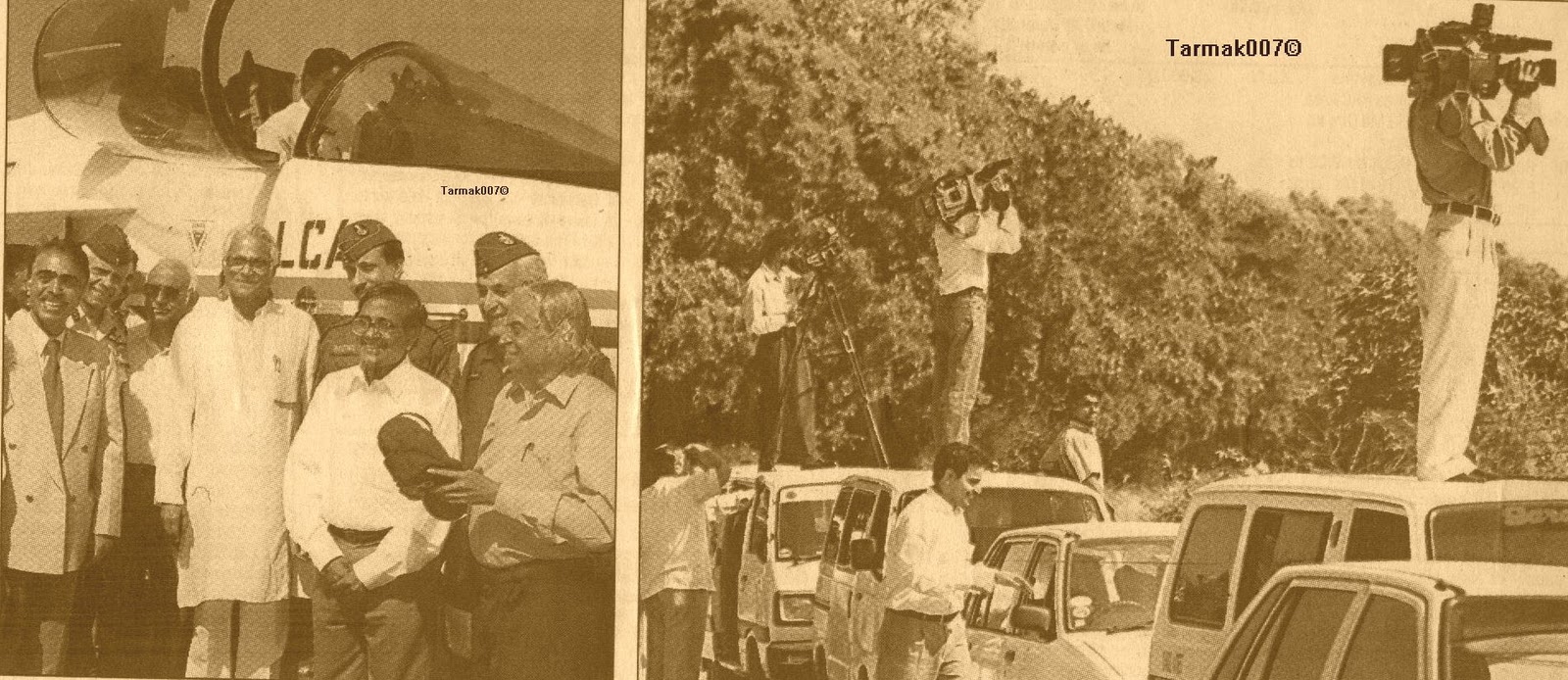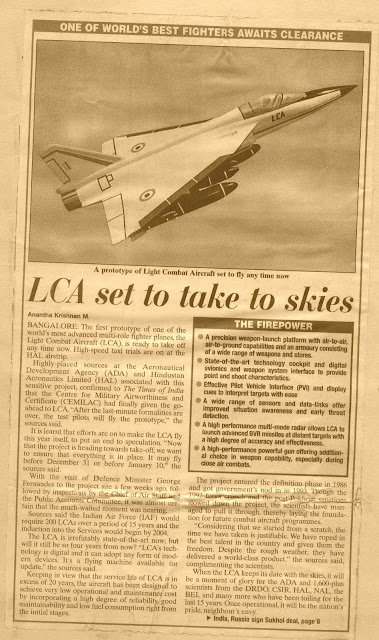Month Before IOC, MoD's Tejas Update In Parliament
One permanent fixture in all reports by the Indian Parliamentary Standing Committee on Defence is the Light Combat Aircraft (LCA Tejas) programme. And exactly month before the programme achieves initial operational clearance on January 10, the panel's latest report was released, containing the following updated account of the Tejas programme so far. Much of it is the same, but with the level of interest in the programme, especially now, there are several new bits scattered around this update. Here it is in full:
The programme of indigenous development of Light Combat Aircraft (LCA) had been initiated in August‟ 1983 with the Government sanction of an interim development cost of Rs 560.00 Cr. This sanction was to initiate the programme and carry out Project Definition Phase (PDP). After completing the PDP, the report was submitted to Government and proposal to build 07 prototypes was made. The Government of India split the programme into Technical Development Phase and Operational Vehicle Development Phase. The Full Scale Engineering Development Programme Phase-I (LCA FSED Phase-I) was sanctioned in April‟1993 at a cost of Rs 2188 Cr (including the interim sanction of Rs 560 Cr given in 1983). The scope of FSED Phase-I was to demonstrate the technologies so that a decision could be taken to build operational proto-vehicles at a later stage. LCA FSED Phase-I was completed on 31 Mar 2004. While Phase-I programme was in progress, the Government decided to concurrently go ahead with the build of operational proto vehicles. The scope of FSED Phase-2 was to build three prototypes of operational aircrafts including a trainer and also to build the infrastructure required for producing 08 aircrafts per year and build eight Limited Series Production (LSP) aircrafts. Government sanctioned FSED Phase-II of the programme at a total cost of Rs 3301.78 Cr on 20 Nov‟2001. The Phase-II programme has been split into two phases namely, Initial Operational Clearance (IOC) and Final Operational Clearance (FOC). Standard of
preparation of operational aircraft was finalized in 2004 with changes in weapons, sensors and avionics to meet the IAF requirements and overcome obsolescence. (Original design was made in 1990s). This contributes to additional time and revised cost for Phase-II.
Governing body of ADA in its 41st meeting held on 22 Nov 2007 had detail review of the Programme and deliberated on achievements vis-à-vis objectives of LCA FSED Phase-II programme and recommended the extension of FSED Phase-II likely date of completion till 31 Dec 2012 (IOC by Dec 2010 & FOC by Dec 2012) with GE-F404-IN20 Engine and to develop & productionise the Mark 2 variant of Tejas aircraft and also recommended the constitution of Cost Revision Committee to assess additional requirement of funds. The need for extension of PDC for LCA FSED Phase-II was due to:
(a) Complexity of the system desgn and very high safety standards lead to extensive testing to ensure flight safety.
(b) Incorporating the configuration changes (for example R60 close Combat Missile (CCM) was replaced by R73E CCM which required design modifications) to keep the aircraft contemporary|
(c) Due to non-availability of indigenous Kaveri Engine‟ design changes were carried out to accommodate GE404 engine of USA.
(d) Change in the development strategy of Radar and associated changes on the aircraft.
(e) Major development activity of Avionics was undertaken in order to make aircraft contemporary, which took time but yielded results (for example, development of obsolescence free open architecture avionics system).
(f) US sanctions imposed in 1998 also led to delay in importing certain items and developing alternate equipment, since vendors identification and development to production cycle took time.
The need for revision of FSED Phase-II fund sanction was mainly due to:
(a) To neutralize the effect of inflation/delivery point cost against the sanctioned level at 2001 and the increase in manpower cost of HAL.
(b) To meet the programme management expenditure due to extended time line till Dec 2012
(c) Maintain and operate 10-15 aircraft for four years upto 2012
(d) To maintain & upgrade the design, development and test facilities upto 2012, in keeping with modern technology
(e) To complete the activities which were not costed in the original estimates.
Cost Revision Committee after careful consideration of the projections made and taking into account the increase in the cost of material, manpower, additional activities to complete the IOC & FOC, maintenance of facilities and expanded scope of the programme etc., recommended additional fund of Rs 2475.78 Cr for completing FSED Phase-II activities with PDC Dec 2012, Rs 2431.55 Cr for developing Tejas Mark 2 with alternate engine (LCA FSED Phase-III Programme) and Rs 395.65 Cr for Technology Development Programme (Total additional funds of Rs 5302.98 Cr). Recommendations of the Cost Revision Committee was accepted by Government and in November 2009, sanction was accorded for continuing Full Scale Engineering Development of LCA till Dec 2018 with an additional cost of Rs 5302.98 Cr.
LCA (Tejas) Programme is progressing satisfactorily as per schedule mutually agreed with IAF to meet their requirements. Flight Test phase on nine Tejas aircrafts to obtain IOC for Tejas, which is mandatory for induction of Tejas into IAF is in advanced stage. Establishment of Tejas production facilities for the production rate of eight aircrafts per annum is progressing concurrently with development activities. On 31 Mar 2006, IAF has executed the contract with HAL for production of 20 Tejas aircraft (series production) powered by GE-F404-IN20 engines in IOC configuration and production activities are in progress. Follow on order of another 20 aircraft is in an advanced stage of negotiation between IAF and Hindustan Aeronautics Limited (HAL).
The issue of Kaveri engine has been delinked temporarily from Tejas Production Programme and use of Kaveri engine on Tejas will be considered after successful completion of mandatory development tests on engine. Initial batch of Tejas production aircraft (Tejas Mk-1) will be integrated with GE-F404-IN20 engines and will be inducted into IAF progressively from Jan 2011 onwards. Development of Tejas Mk-2 with alternate imported foreign engine (LCA FSED Phase-III) to improve aircraft performance has been launched concurrently with LCA FSED Phase-II programme.
In addition to the weekly reviews conducted at ADA and the Governing Body & Annual General Body Meetings, the Honourable Raksha Mantri has set up Special Review Committees with the Chief of Air Staff reviewing the programme once every quarter and Deputy Chief of Air Staff reviewing every month to ensure that the objectives of Tejas Programme are achieved without any further cost and time overrun.
Livefist - Indian Defence & Aerospace: Month Before IOC, MoD's Tejas Update In Parliament















